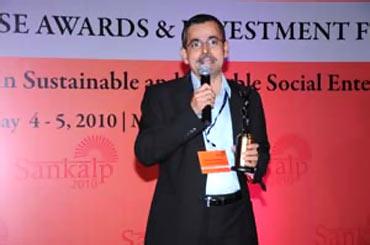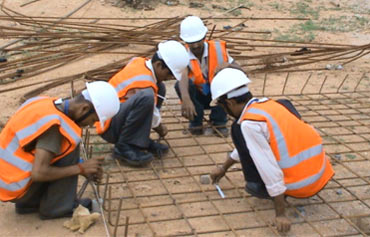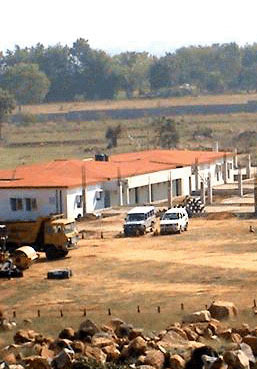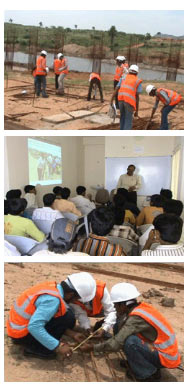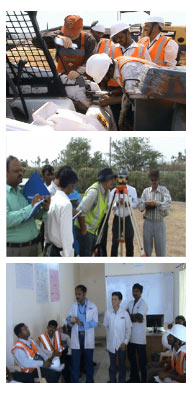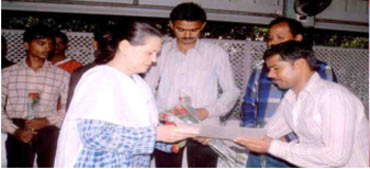 | « Back to article | Print this article |
This startup does not want to make big profits
The story of an amazing individual who has turned conventional start-up logic on its head. Meet Santosh Parulekar of Pipal Tree ventures, whose main objective is to create social good instead of maximizing profit.
It defies economic logic to hear an entrepreneur say, "We don't want to make big profits." But then the vision of Santosh Parulekar and his business venture Pipal Tree is to create social good, "not maximise profits."
It is this vision that made Santosh, 37, quit a well-settled career abroad and scour rural India to find and train young boys for free, and within a month, place them in the construction industry where they earn Rs 5,200 as their first salary.
In the last four years since its inception, Pipal Tree has trained 5,000 boys and girls (girls are trained in operating tools and machines and provided employment close to their homes) from the hinterland of Andhra Pradesh, Uttar Pradesh, Bihar, Rajasthan, and more recently from Maharashtra.
Santosh's tryst with rural India began in 2004 when Vistaar, the US-based private equity company he was working for, asked him to find out about the business model of SKS Microfinance, which had pitched for equity funding from Vistaar. His foray into rural India and how micro finance institutions (MFIs) worked left him disgruntled.
While most of these MFIs intended to create livelihoods for rural women, Santosh, who had spent four years as a corporate banker in Europe for Citibank, discovered they were only acting as financial intermediaries interested in profit maximisation.
"For instance, in one village these MFIs were giving money to buy buffaloes but they had no clue if that money would be used to actually buy buffaloes," says Santosh over the phone from a small village in Rae Bareilly in eastern Uttar Pradesh, where he has one of the 13 centres that train rural youth to acquire skills needed in the construction industry.
"Eventually, a number of these MFIs admitted they were in the business of lending money and earning interest rather than creating livelihood," says Santosh who was by then veering towards the idea of creating livelihood opportunities.
"The second thing I could not get very convinced about was, while there were many women who got money from MFIs, they were actually not helping young boys and girls, and there were many, in these villages I visited," he continues.
That is when he started thinking if he could do something to help create livelihood for the rural youth. He discussed his idea with two friends – Shailendra Ghaste, managing director of IDFC Capital and Vikram Reddy, director of KMC Construction, a construction company based in Andhra Pradesh. Soon, Santosh's noble vision began to take shape.
Click NEXT for more
This startup does not want to make big profits
He, however, suggested that they should focus only on creating a meaningful livelihood and not lend money.
"Because when you lend money the focus is to maximise profits," he argued with his friends, who, like Santosh, also wanted to do their bit for the society. A few months later Santosh chipped in with Rs 40 lakh (Rs four million) and Shailendra and Vikram with Rs 30 lakh each (Rs three million) as seed capital and Pipal Tree was born.
With the easy part of getting the seed money in place, Santosh mulled over the kind of employment and skills they could provide to these rural youth. He wanted to focus on skills that will not take time to train, could be easily scaled and would suit the requirement of the rural, semi-literate youth.
"We knew that only the construction industry is huge enough to provide employment (it is the second biggest employer after agriculture) to such a large number of people that would befit their profile. They are conditioned to hard work (most of them being farm hands) and that is why I decided to focus on construction," says Sanosh who studied electronics engineering at Mumbai's VJTI and has an executive MBA from S P Jain Institute of Management, Mumbai.
"When we began, all three co-founders were convinced we would have to sustain initial losses," says Santosh in jest while explaining the nature of their venture.
They first thought of starting Pipal Tree as a trust (to avail of tax deductions and concessions that come with running a trust). "But then most of the MFIs started as trusts and then became non-banking finance companies that went after profit making," says Santosh.
"For us the goal was pretty clear from Day 1: Social good would take precedence over maximising profits," says Santosh about his team's conscious decision to keep profits lean even as they operate as a for-profit company.
Click NEXT for more
This startup does not want to make big profits
They knew that being accountable for the money they would lose would only egg them to make profits on a sustainable way in the future. They had the conviction that they would make profits based on their business model.
In 2011, after making a loss of Rs 4 crore in the fist two years of operations, Pipal Tree, says Santosh, will post a profit of ten per cent on a turnover of Rs 10 crore.
It is in this context that Santosh says Pipal Tree does not want to make big profits or maximise them. Instead, his profit model is based on increasing the turnover of the company, all the while maintaining a profit margin of not more than 10 per cent. "We want to grow by increasing our turnover but keeping the profit constant at say 10 per cent. The rest of the money we want to roll back into the business to create more livelihoods and attract more people."
And Santosh has been putting his money on what he preaches.
Whenever he had to choose between maximising profits and welfare of the boys and girls Pipal Tree trains and employs, the balance always tilts in favour of the latter.
Like providing free training, food and accommodation to boys and girls who train at the 13 training centres in India.
Providing them with safety gear and shoes in case the construction company they work for does not make the provision.
Convincing the construction companies to provide provident fund, insurance and basic amenities to the workers. Taking the cost of insuring workers till the construction companies take them on their rolls.
And more recently, providing cashless mediclaim facilities to his workers by paying their premium out of the profits Pipal Tree makes and facilitating the semi-literate/illiterate family members of the workers avail of the cashless mediclaim by getting in touch with a two-member call centre established for the purpose.
But before one takes Santosh for a maverick sinking his company -- like the politicians who dole out goodies for populism – one should listen to his rationale for doing so. And when you do that, he explains with a passion and wisdom that comes from Pipal Tree's vision of creating livelihoods.
In an interview with Prasanna D Zore, Santosh talks about the rationale for not bringing in financial investors, not running after profits, why he thinks offering mediclaim and other such facilities to his workers makes economic sense, and, of course, his success mantras and start-up dos and don'ts.
Click NEXT for more
This startup does not want to make big profits
'If you feel you must do it, then you must do it'
How did the idea of providing medical insurance originate?
It did not come to us as the first thought. Three months ago, one of our boys from Jaunpur (Uttar Pradesh), who is working with us at a site in Andhra Pradesh, lost his two-year-old daughter to pneumonia. He earns around Rs 10,000. His family did not admit her to the hospital thinking it was an unnecessary cost. It was the saddest thing for me. I got the news only when somebody told me that he had left for his village on emergency leave. Even he was not told the situation was serious.
His daughter died because she was not admitted to a hospital for want of money. So, we decided to offer medical insurance to most of our boys after looking out for insurance companies that offer such facilities in rural areas because most of my boys come from there.
I want my boys to avail of cashless facility even if it is for a small amount. So, for us National Health Insurance Scheme makes sense.
But again the problem is most of these boys and their families are illiterate and to handle cashless facility I have started a call centre in Mumbai wherein they facilitate hospitalisation of the sick family members. My office staff coordinate with third party insurers and gets the job done for my boys.
Net-net the organisation becomes a support system. I do it because by doing this even if we manage to save one life a year then it is worth all the efforts. If you feel you must do it, then you must do it.
Looking at it from a business point of view also makes sense to me because by doing so my company inspires confidence in them that they and their family are well taken care of and as the word of mouth spreads we get more people coming to us rather than we going to them by spending money.
When people come to us we save money, my cost of acquisition goes down and that adds to our top line. That in a way explains why we don't want our profits to be more than 10 per cent of our revenues.
How did you manage to turn around the loss-making situation?
In fact, in the third year we broke even and in the fourth year I can assure you that we are making decent profits. Let me be very clear here that we don't want to make very huge profits. We want to make a reasonable profit as the percentage of our revenue but want to plough most of our profits back into the business so that it can help generate livelihoods for many more rural youth.
Our focus is not on profit but volume of revenue we generate. The more the revenues, the higher the profits for Pipal Tree.
Click NEXT for more
This startup does not want to make big profits
'In the last four years we have trained 5,000 people'
Could you tell us how Pipal Tree finds these rural youth, train them, offer them employment and help create livelihoods?
We have a rural marketing team that goes to villages and explains the youth about our programme that would help them earn money and employment opportunities. We tell them that our training comes absolutely free to them and we get our money from the company that hires them. The company pays us for the time they work over the next 12 to 18 months. Depending on various salary brackets the companies who hire these rural youth pay us anywhere between Rs 500 to Rs 1,000.
At the same time, we explain to these people that we will continue to train them for over 18 months to help them upgrade their skills and climb up the ladder. When they get convinced that we are not looking out for money from their pocket, and all the while trying to help them earn a livelihood, they start trusting us. We just look for boys and girls who are willing to work hard and get trained in various skills around the construction industry.
There are different skills based on the level of education earned by these people. We teach different skills to someone who has failed in Class V and left her/his studies compared to those who have passed their Class X. Majority of the boys we have are not Class X pass.
How many boys and girls have you trained till today?
In the last four years we have trained 5,000 people who have not even cleared Class X.
Out of the 5,000 we have trained in the last two years only 3,000 could be working. The others have left their jobs somewhere in between as they get better opportunities or want to go back to their native places. Each year we train 200 to 300 girls in special skills involving tool operations. For these girls once they complete our training they start earning Rs 7,000 per month. Also, we try to place these girls in and around their hometowns so they manage to stay with their parents. Most of these girls start earning Rs 10,000 per month within 18 months of their learning the skills.
How does the salary structure work for them?
Normally, most of these boys start with a salary of Rs 5,200 after completing four weeks of training with us. After six months on job, their salary is hiked to Rs 6,000 and after 12 months they start earning Rs 6,600. After the 18th month my boys start getting Rs 7,500 and within two years he starts earning Rs 10,000 per month.
We earn money for every person we offer employment only for the first 12 to 18 months.
We conduct classes for these workers on the site to help them upgrade their skills till the time they become supervisors (mostly after 18th month). At the end of the first 12 months of training they become experts in their fields and are ready to progress on their own. And I am proud to say that after the first 18 months of training they become confident enough to decide for themselves and negotiate a better career growth on their own.
Normally, the company that employs these boys provide accommodation free. If the company provides food to them then the company deducts Rs 1,000 from their salary.
Click NEXT for more
This startup does not want to make big profits
'I had made a conscious decision to not splurge my money on fancy cars'
With how much seed capital did you start Pipal Tree?
We started Pipal Tree with a seed capital of Rs 50 lakh (Rs five million). Two of my friends have also invested in the business but I look after its day-to-day operations.
Were your friends convinced that this business would make money for you all?
Thankfully, all of us believe that the sole purpose of Pipal Tree is not to make money but to create social good on a sustainable basis. We were all convinced about the business model and had the conviction of coping with losses in the first couple of years.
In the first two years we started getting strategic investors like construction companies and we got money from IDFC Capital also. It makes sense for infrastructure companies to invest in us as most of these companies have shortage of skilled manpower. Ideally, they look to outsource this need and let people like us handle the issue of shortage of manpower.
How much money did you personally invest in Pipal Tree?
Three of us invested around Rs 1 crore to start Pipal Tree. I chipped in Rs 40 lakh (Rs four million) and Shailendra and Vikram each put in Rs 30 lakh (Rs three million).
I put my own savings into the business. I spent a lot of my career life abroad and managed to save decent money and wanted to make use of this money to create social good. I had already made a conscious decision to not splurge my money on fancy cars or creating assets. To give you an example for the last ten years I am using the same Lancer.
Challenges you faced and how did you overcome them?
The biggest challenge is how to attract more and more young, semi-literate rural Indians to the construction industry.
Though most rural boys want a job and earn money their willingness to work hard is not high. So, the challenge is to find the right type of boys who want to work hard, earn money and make a career in the construction sector.
The other challenge is to reform the work practices employed by the construction industry as they are not really encouraging to someone who starts as a worker. Site conditions for these labourers are very bad. Their views about their workers are pathetic and their practices – related to salaries, delays in salaries, provident fund, insurance etc -- are very bad too.
That creates more problems for us to attract more people into this industry.
Click NEXT for more
This startup does not want to make big profits
'Business plans may go awry midway. Be prepared'
Have you managed to convince the companies to give these facilities to almost 3,000 workers you have helped create livelihood for?
Yes, all of them now get their providend fund and insurance and timely salaries every month. Initially, when a boy gets employed he may not get insured for the first few months. So what we are doing is we are providing them with medical insurance, under the National Health Insurance Scheme, till the time they start getting covered by their employers. We pay the premium so that the workers and their families are covered under the scheme.
Our effort is to get all the companies that employ construction workers through Pipal Tree provide insurance to them.
Dos and don'ts for start-ups and lessons you learnt in this business...
One important do is to understand the industry one wants to operate in and focus all the energies there. The second do is to have a concrete plan for your business development.
But don't rely completely on that plan as things may go awry midway. This happens because all plans are built on a lot of assumptions and the factors underlying these assumptions may change because of the dynamics of the industry one operates in.
While planning gives entrepreneurs the confidence that things will work out, my experience is most things don't work out as planned.
The other do is to have short-term goals and long-term goals. Like we are not charging people money upfront but getting paid by the companies that employ them after they get their salaries. If you look at it, it is not an attractive model for us.
So, while we may face some difficulties in the short-term by following this model I am convinced that my long-term interests are secure as more and more boys join us.
For example, my first business model was to work with a bank to give our workers loan to get trained. As they start earning they pay EMIs to the bank. So the entire liability of paying the bank rests with him. That is good for Pipal Tree. While nationalised banks did give loans to 40 people they started pushing for more documents and red tapism. So we started to work with MFIs to give them the loans.
The problem here was out of the total loan they had to pay 25 per cent in advance to the MFIs. This was becoming a huge burden for the boy. It could also happen that after training, the boy may not like the work – maybe because of personal reasons or because of the issues associated with the construction industry – and still have to pay interest on his loan. Whatever the reason, it didn't make social sense for me to keep the boy under pressure.
The logic was the boy was leaving us because he thought he was not getting any value out of it. So there was no point in holding him back. Being in the business of creating social good we had to see if the boy was getting value out of it.
The bottom line was if we were not delivering any value to the boy we should not charge him. So we needed to change our model.
The other don't would be one should not be driven and dictated by business models but look at what could make the business successful.
Click NEXT for more
This startup does not want to make big profits
'When financial investors come they force you to earn high profit margins'
What is your success mantra?
Perseverance is very, very critical to achieve success. The second ingredient for success is confidence in your ability to make things happen. One has to keep trying different things, try different methods to come out with an efficient solution.
Sometimes, when things go wrong you are under pressure from your investors and peers.
Did you face such a situation?
Yes, when we changed our model and decided to train these boys for free and provide them with insurance till their employers took over the responsibility they (our investors) were not happy with it.
I told them I too have put in significant money in the venture, kept aside my professional career to do it full-time. I convinced them that I was going to put in all the possible efforts to make Pipal Tree a success despite my decision to take these new costs.
I told them I was confident of turning around things in the next six to nine months. But back then, I must admit, that I was not 100 per cent confident of success. I knew so many things were going against us. The boys were not too interested, the financial institutions were asking for more papers to sanction loans.
Fortunately, the new model started showing some results and encouraged me to go ahead with the new strategy. I started being hands on, managing the boys on site, looking after their every need. It looked it could work provided I put in more efforts.
What is your turnover?
Last year our turnover was Rs 6.5 crore and we had broken even. This year our turnover will be Rs 10 crore and we will make some reasonable, say 10 per cent of turnover, profits.
We don't want to make big profits. We want to grow by increasing our turnover but keeping the profit constant at say 10 per cent. The rest of the money we want to roll back into the business to create more livelihoods.
But are all the stakeholders in Pipal Tree in consonance on this point?
As long as we keep increasing the revenue they are okay with it.
But wouldn't they be happier if your profit margins too increased along with your revenues?
That is the reason why we are not taking any financial investors on board. When such investors come they force you to earn high profit margins and it is our conscious decision to create more of social good than financial good. That would make us lose sight of our main vision of creating social good.
As for medical insurance, we started recently after we started making profits. We told ourselves, if we are making profits then why not put some money for the betterment of our boys and through them the society.
We cover our boys and their families for a year and eventually the construction companies that hire them offer them medical insurance.
